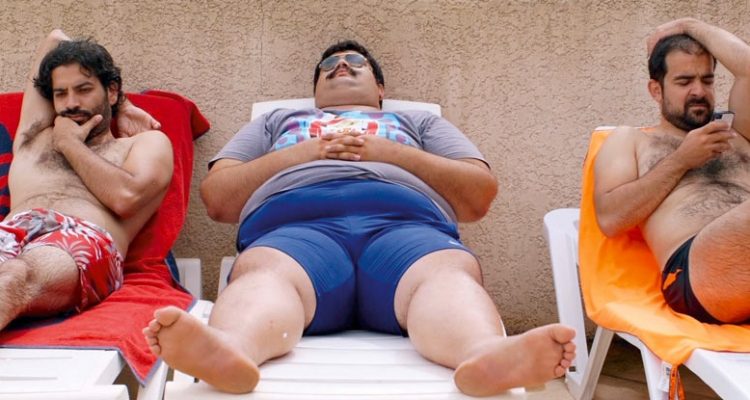On the festival circuit, where Maryam Goormaghtigh‘s modest but deeply charming and affecting solo directorial debut “Before Summer Ends” will inevitably find its natural home, there’s been a little hesitation about whether to classify it as a documentary or a fiction feature. The actors play loose versions of themselves — sharing first names with their characters — and the admittedly inconclusive scenario, about three Iranian ex-pat friends taking a trip to the South of France before one of them returns to Tehran, is an easy amalgam of situations familiar to both the newcomer stars and the neophyte filmmaker.
But don’t let the loose, improvisatory style and supremely naturalistic performances fool you: even aside from the delightful, colorful and carefully composed cinematography (also courtesy of Goormaghtigh) there is a gentle, premeditated point to be found in almost every scene here. The road-trip narrative, rambling and episodic though it is, drifts unerringly toward bittersweet, serio-comic truths about dislocation, homesickness and camaraderie, that feel like the result of an amused, affectionate, but very sure hand honing whimsy into wisdom and documentary into drama. In fact, if it’s classified as documentary at all, it may be because the undemonstrative but preternaturally endearing three-way relationship at its center is so spontaneous and true it simply feels like it cannot possibly have been fabricated from anything other than whole-cloth reality.
Our offbeat triumvirate comprise girl-crazy aspiring photographer Ashkan, married dreamer and dreamboat Hossein and the film’s physically and metaphorically biggest presence, Arash, a shy, overweight, mustachioed guy approaching the end of his studies, who tends to clam up, and hide the sweetness his friends cherish in him behind his bulk, whenever other people are around. At the outset of the film, the three of them are lolling around Arash’s poky, untidy bedroom before Ashkan and Hossein talk him into one last hurrah before he leaves Paris: a trip to the beach in the South of France.
The friends talk about life, the universe and everything while encountering small-town parades, going for impromptu lake swims and bickering over food in verdant campgrounds en route. They knock back beers, eye up girls and doze in the sun. And their radio-accompanied, car-bound heart-to-hearts are mostly chit-chat and friendly trash-talking , but every now and then, out tumbles one of those confessions that long car journeys often prompt. They all have their reasons for living abroad — whether it’s the greater freedom (and beloved beer-drinking) that their more secular life here affords them, or the fact that going home will see them drafted into military service and/or marriage. One slightly heartbreaking detail is in the casual aside that Arash gained all his weight deliberately so that he would be ruled ineligible for the army. Still, he breaks into his big smile, what a time he had doing it!
Such scattered little moments of insight abound. After trying subtly to talk Arash out of returning home to an overbearing father and a proscribed life back in Tehran, Hossein admits to a very specific ambivalence, recognisable to ex-pats and migrants the world over: that he feels happier back in Iran, but in France he is more like the person he wants to be. They speak irreverently, though never disrespectfully, of the religion they have little time for here, playfully teaching the two French girls they meet, Charlotte and Michèle, how to tie a veil in the various fashions they recall. And throughout, the most surprising, refreshing quality of the film is that its perspective remains absolutely with them, even though they are the “outsiders” — we are with them inside their car, inside their private universe of in-jokes and shared frustrations, inside that particular cone of joy and misery that is being a stranger in the strange land you’ve decided to call home.
Goormaghtigh is of Iranian extraction but was born in Geneva, and her film won her the Emerging Swiss Talent prize at the recent Zurich Film Festival (which I know because, full disclosure, I was on the jury that awarded it). And it really is a remarkable feat of heartfelt, headstrong independent filmmaking: she shot the film on her own camera, to an outline she improvised with her actors, before she had any funding or production budget in place. And so although she concertinas about a week’s vacation into an efficient 80 minutes that manages to feel as fluid, langorous and warmly nostalgic as a lazy summer day (set to an equally charming score by Marc Siffert), this off-the-cuff approach also gives the film an exuberance and a sense of freedom as evocative as that first sniff of salty sea air.
Perhaps it’s that we’re not used to seeing men of this ethnicity depicted with such a light, good-humored touch, especially in these times of immigrant crisis and mounting xenophobia. Perhaps it’s also that we’re not used to seeing men of any ethnicity interact with such tender, unembarrassed affection toward each other, for all the beer-swilling hi-jinks and light ribbing. But “Before Summer Ends,” with its trio of good-natured friends helping each other navigate homesickness and hopefulness and presumably the odd hangover in their quest to find their place in the world, is a rare thing: one of the smallest, humblest films of the year, it’s encased in an enveloping, enormous compassion that also makes it one of the kindest. [B+]

